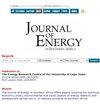Determining the causes of electricity losses and the role of management in curbing them: A case study of City of Tshwane Metropolitan Municipality, South Africa
IF 0.6
4区 工程技术
Q4 ENERGY & FUELS
引用次数: 6
Abstract
The problem of energy losses, both nationally and internationally, is a leading cause for the financial collapse of most utilities. A quantitative research approach was adopted for this study where a questionnaire was used to collect information from the participants. A total of 113 City of Tshwane (CoT) employees within the electricity division participated in the study. Descriptive statistics and inferential statistical methods were used to analyse the outcome of the survey. The study found that technical and non-technical losses are the major cause of revenue loss. Non-technical losses are caused either by inefficiencies in managing losses or by end-users being unwilling to pay for electricity. The study found that power theft through meter tampering, incorrect billing by employees, and cable theft were also major causes of energy losses. Illegal connections were found to be the major cause of energy losses, along with power theft and lack of resources. Deficiencies in infrastructure maintenance were found to be the main cause of technical losses. The study found that management of CoT is committed to managing energy losses, being aware of their impact on the financial well-being of the municipality. There is an established policy of managing energy losses and there is a plan to replace ageing infrastructure. Employees are continuously trained in accurate billing and metering as part of efforts to curb energy losses. The municipality is also engaged in efforts to put educational programmes in place to inform communities about electricity theft.确定电力损失的原因和管理部门在控制损失方面的作用:以南非茨瓦内市为例研究
无论是在国内还是在国际上,能源损失问题都是大多数公用事业公司财务崩溃的主要原因。本研究采用定量研究方法,采用问卷调查的方式收集参与者的信息。共有113名茨瓦内市电力部门的员工参与了这项研究。采用描述性统计和推理统计方法对调查结果进行分析。研究发现,技术和非技术损失是造成收入损失的主要原因。非技术损失是由于管理损失效率低下或最终用户不愿支付电费造成的。该研究发现,通过篡改电表、员工不正确计费以及电缆盗窃来盗窃电力也是造成能源损失的主要原因。非法连接被发现是造成能源损失的主要原因,此外还有电力盗窃和缺乏资源。发现基础设施维修方面的缺陷是造成技术损失的主要原因。研究发现,CoT的管理致力于管理能源损失,并意识到它们对市政当局财务状况的影响。有一项管理能源损失的既定政策,也有一项更换老化基础设施的计划。作为遏制能源损失的一部分,员工们不断接受准确计费和计量方面的培训。市政当局还努力实施教育方案,向社区通报盗窃电力的情况。
本文章由计算机程序翻译,如有差异,请以英文原文为准。
求助全文
约1分钟内获得全文
求助全文
来源期刊

Journal of Energy in Southern Africa
ENERGY & FUELS-
CiteScore
3.00
自引率
0.00%
发文量
16
审稿时长
6 months
期刊介绍:
The journal has a regional focus on southern Africa. Manuscripts that are accepted for consideration to publish in the journal must address energy issues in southern Africa or have a clear component relevant to southern Africa, including research that was set-up or designed in the region. The southern African region is considered to be constituted by the following fifteen (15) countries: Angola, Botswana, Democratic Republic of Congo, Lesotho, Malawi, Madagascar, Mauritius, Mozambique, Namibia, Seychelles, South Africa, Swaziland, Tanzania, Zambia and Zimbabwe.
Within this broad field of energy research, topics of particular interest include energy efficiency, modelling, renewable energy, poverty, sustainable development, climate change mitigation, energy security, energy policy, energy governance, markets, technology and innovation.
 求助内容:
求助内容: 应助结果提醒方式:
应助结果提醒方式:


